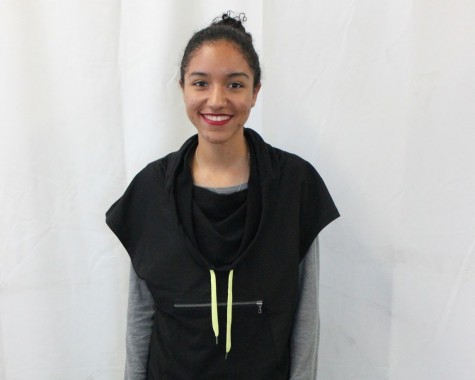Opinion: Latinos in Hollywood
January 30, 2015
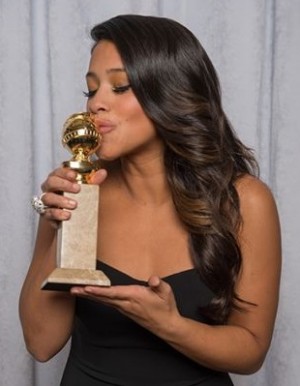
Golden Globe winner Gina Rodriguez is very outspoken about her Latina identity and the importance of her win for Latinos in Hollywood.
Rodriguez won for Best Actress in a Television Series – Musical or Comedy for her role in the CW network’s freshman series “Jane the Virgin” for her portrayal of a 23-year-old pregnant virgin on Jan. 11. This is the CW’s first Golden Globe nomination and win.
So far, only two Latinas have ever won a Golden Globe award for best actress. The first Latina was America Ferrera, who took home a Golden Globe for her role in the television show “Ugly Betty” in 2007.
“This award is so much more than myself, it represents a culture that wants to see themselves as heroes,” Rodriguez said during her acceptance speech.
Another Latino who received an award that night was Mexican born director/writer Alejandro González Iñárruit, who took home Best Screenplay for “Birdman.”
Rodriguez was recently nicknamed the entertainment industry’s “Next Big Thing” by The Hollywood Reporter. Widely known that much of Hollywood storytelling is done in black and white, there continues to be an exclusion of minorities– Hispanics/Latinos, Asians, African Americans and others who seem to fit into the narrow minded one-dimensional stereotypes of their respective cultures in the entertainment industry. Due to this, not enough of talented Latina actresses have received the recognition they deserved or roles that were the reality of everyday life.
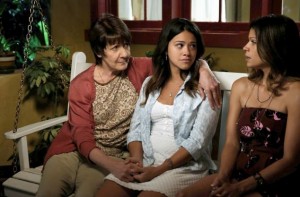
When Rodriguez came to find “Jane the Virgin,” she thought the show — which is roughly based from a Venezuelan telenovela — was the “most authentic, genuine representation” of a Latino family that she had ever seen on television, she told The New York Times in “‘Jane the Virgin’ Aims Beyond Its Latin Ethnicity.” The show’s concept is original from most things that have been shown on TV in the past 10 years. It’s charming and exhibits the humor of certain cultural references tastefully and in respect.
“For once, I was reading a script where they weren’t talking about my ethnicity,” she told the Times. “They weren’t putting a Puerto Rican flag on my shoulder. They weren’t putting a taco in my hand.”
Rodriguez recently said in an interview with Cosmopolitan that she wants to play the roles she sees in her everyday life. “My sister is a successful investment banker; my other sister is a doctor. I want to see those roles. I want to see Latinas play roles that are empowering, that are strong, that break the norm!”
An NYU Tisch School of the Arts grad, who became a breakout star and rapped in 2012’s Sundance hit “Filly Brown,” Rodriguez took a stand early in her career that she won’t play characters unless they serve as role models for young Latinos.
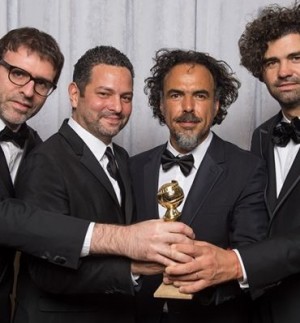
“My dilemma,” she says, “was to follow a dream that seemed unfathomable in an industry where my culture wasn’t portrayed in a positive light… if we can create an effect that shows Latinos like the investment bankers, doctors, lawyers that existed in my own home, I think that will change the way young girls and boys look at themselves,” Rodriguez answered to reporters’ questions on the night of the Globes.
Television and film are supposed to be a public outlet that creates a reflection of reality. But for a long time now, a lot of the Hollywood film and television industry have been white-washed. It’s always been that way and it’s a continuing problem that many major entertainment execs tend to try to prove otherwise by producing material that tells the “Latinos stories.” What does that mean?
Well basically it means if your skin color is brown and you speak Spanish or Portuguese you are immediately offered the role of the young pregnant teen, the housekeeper or a gardner. Not to blast these professions as pathetic or dishonorable because in reality they do pay well and there’s nothing wrong with attaining any one of them. But they aren’t the Latino portrayals that should represent this culture to the masses. Plus these aren’t just Latinos that are doing these jobs and that represent their stories.
“I felt very limited by the opportunities I had in Hollywood to play the maid, the pregnant teen, the drug addict. Those all exist, but they all exist in every ethnicity and culture. I wanted to tell stories that showed little girls because when I was younger, I didn’t see us in ‘Casablanca’ and these phenomenal movies that told the human story,” Rodriguez said in an interview with The Hollywood Reporter (THR).
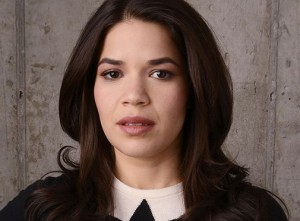
It seems to exist in the American culture that if you want to make it big in the movie business but you’re apart of a certain minority that you tend to be offered and mostly play specific roles, stereotypes, that the general public most associates them with. No one wants to be limited to the environment that surrounds them, or their skin color. And with specific roles such as, the drug addict or the exotic single mom, it becomes limiting to expand one’s acting abilities in their career, as if though the Latino, Asian or Black stories are any different.
“We just want to see a slice of life. We want to be able to connect. We want to cry. We want to look at our lives on screen. It’s clear to me that execs need to step outside of their office and really look at life. We are in interracial relationships. We speak multiple languages. We’re multiple religions inside of that. We need to start casting color-blind because there is no specific anymore,” Rodriguez said in an interview with THR.
What’s so refreshing and unique about Rodriguez’s character Jane is that she’s the “every-girl.” Jane is not specifically Latina; she could’ve been played by anyone. She’s a person who’s hardworking, has a close relationship with her family and has high dreams and career goals that she expects herself to accomplish.
Rodriguez ended her heartfelt speech at the Golden Globes with some motivational advice. “My father used to tell me to say every morning, ‘Today’s going to be a great day. I can and I will.’ Well, Dad, today’s going to be a great day. I can and I did.”


